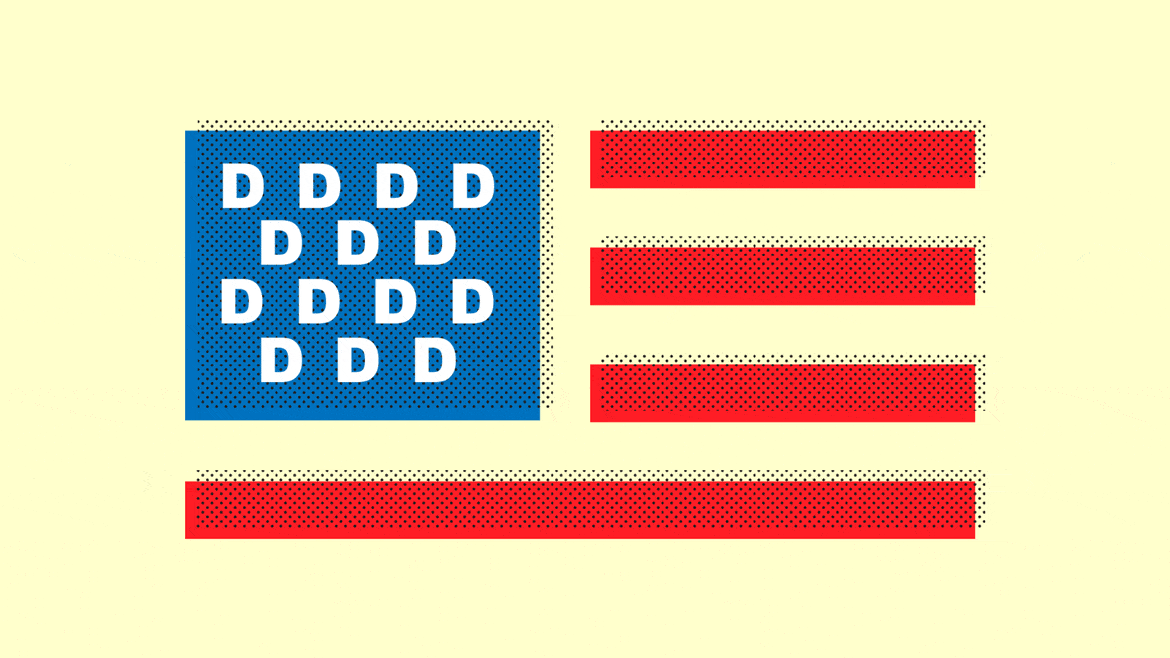One-Party Domination (for a While, Not Forever) Is Good for Democracy

Talk about being too close for comfort. The 2024 presidential race is all tied up, according to the latest NBC News poll. This survey (unlike some polls), is no outlier. The race between Joe Biden and Donald Trump has been effectively tied for months. Looks like we’re in for another nail-biter.
On one hand, this stalemate makes perfect sense. As Cook Political Report’s Amy Walter reminds us, Trump won the 2016 Electoral College by about 79,000 votes in three states, Biden won in 2020 by less than 45,000 in three states, and Republicans won the House by a very narrow margin in 2022. “This is going to be a close race,” Walter concludes.
But after everything that has happened since 2016 (Jan. 6, two impeachments, four indictments, and—more recently—Trump saying that Gen. Mark Milley deserves execution and that NBC News should be investigated for treason), you might have expected a seismic political shift in favor of Democrats. Instead, despite all the craziness, the result has been a race that is effectively a draw.
Ron DeSantis’ Campaign Is Plummeting Because He Won’t Choose a Lane
This matters because it’s a signal to Republicans that what they are doing is working. After all, if it ain’t broke, don’t fix it.
We can certainly discuss the past damage Trump has caused the GOP, such as losing the presidential election in 2020 (if only Republicans believed he lost!), sabotaging two Senate seats in Georgia, and endorsing weak candidates like Herschel Walker in the 2022 midterms.
However, Republicans don’t feel defeated and can’t imagine losing to a doddering Biden; therefore, Trump has no incentive to change, and Republicans have no incentive to move on.
And why should they? Republicans took the House in 2022 (although the margin was more narrow than predicted). And if you believe the polls, Donald Trump is poised for a second term.
If that happens, it will likely be another nail-biter (possibly the result of Trump eking out another Electoral College victory), and it will only be the latest manifestation of a problem that has plagued us for decades now: America is intractably a 50-50 nation.
No, I’m not suggesting that America’s political parties have been in a constant draw every moment of every day (indeed, look at the radical shift from Barack Obama and a Democratic-dominated Congress in 2008 to the rise of the Tea Party Republicans in 2010). These perpetual oscillations are evidence of the dysfunction.
The problem, as it pertains to our evenly divided nation, is the lack of what political commentator Samuel Lubell called a Sun Party (the party that is clearly in charge) and a Moon Party (the party that takes a subordinate role). Under normal conditions, one party naturally assumes a leadership role for a while, while the other assumes a subordinate role.
The Deep State Didn’t Frame Russell Brand, You Idiots
“During Franklin Roosevelt’s era, Democrats were the Sun Party. During Ronald Reagan’s, Republicans were,” noted David Brooks in 2011. “Then, between 1996 and 2004, the two parties were effectively tied. We lived in a 50-50 nation in which the overall party vote totals barely budged five elections in a row. It seemed then that we were in a moment of transition, waiting for the next Sun Party to emerge.”
Sadly, that never happened. And the results have been… well, look around.
Absent a sun and moon party (as has been the case in modern America), bad things happen.
The party currently in power doesn’t have time to win the argument before they win the vote. In this scenario, newly elected presidents tend to misread their mandates and swing for the fences during their first two years in office because the midterms will change the congressional makeup, bringing their policy agenda to a screeching halt. (This assumption often becomes a self-fulfilling prophecy.)
But the lack of a sun party doesn’t just hurt presidents, it also renders legislative bodies impotent and dysfunctional.
When one party assumes the mantle of sun party, the losers eventually begin to accept their moon status and grudgingly accept their subordinate role. They realize that stunts or refusals to compromise will not result in their re-election, so they have an incentive to accept their fate, work together to get what they can, and deliver for their constituents.
Why I Can Never Forgive Rupert Murdoch
But what happens when there are two moon parties? In that scenario, the out party assumes they’ll be back in power in a few years. This means that they can just try to run out the clock. This means they never have to go into the wilderness and have a “come to Jesus” moment. This means they never have to change.
“[I]n the era of the two moons,” Brooks warned in 2011, “the parties enjoy periodic election victories they don’t deserve, which only reinforce their worst habits.” I think he perfectly described why—despite all the chaos—the Republican Party hasn’t changed since 2016.
Ironically, the same phenomenon that has everyone believing they are on the cusp of victory also creates a victim mentality. The result is the apocalyptic belief that this next election is the party’s last chance to ever win again. This fosters a desperation and an “ends justifies the means” mentality.
Two moon parties can lead to all sorts of dark places.
But the question remains. When, if ever, will the sun shine again?
Get the Daily Beast's biggest scoops and scandals delivered right to your inbox. Sign up now.
Stay informed and gain unlimited access to the Daily Beast's unmatched reporting. Subscribe now.


